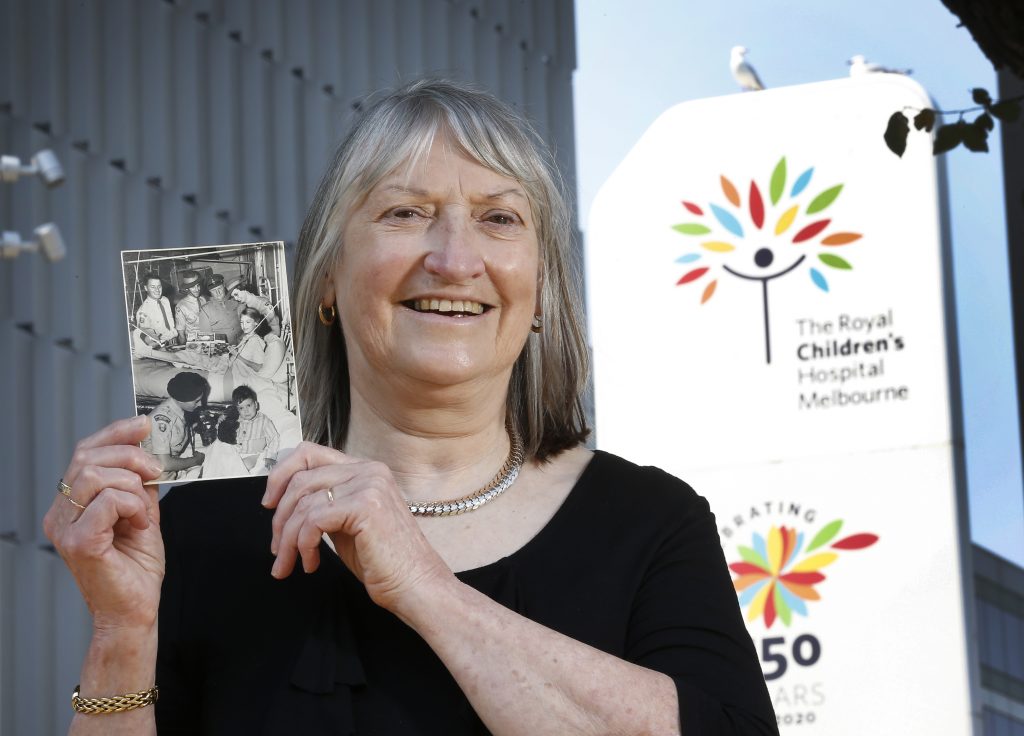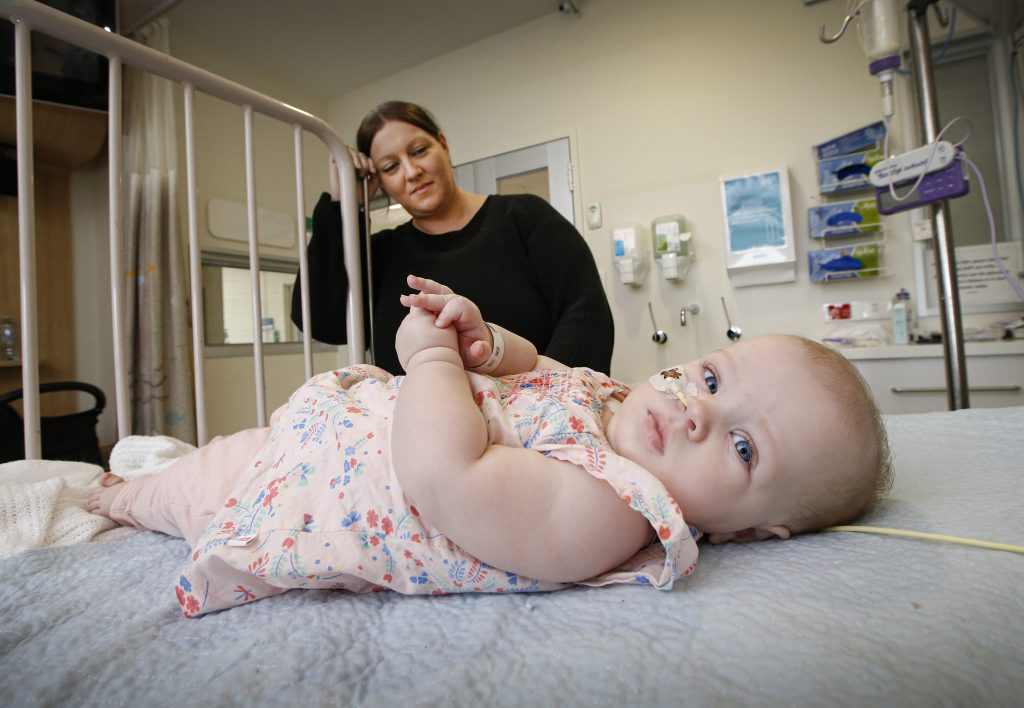Originally published in the Herald Sun, 27 March 2021
Words: Brigid O’Connell
Photo: David Caird
As the Good Friday Appeal celebrates 90 years of supporting The Royal Children’s Hospital (RCH), patients from different eras share tales of care.
The RCH has been world renowned for providing world-class care, for whatever that means throughout each era. That includes caring for Christine Phillpot and Finley Sherwood, who have both been patients at the RCH more than six decades apart.
Finley’s diagnosis of a rare low blood sugar disorder has only been possible through sophisticated genetic testing, which didn’t exist a decade ago. With her mum living by her side, multiple teams around the hospital have rallied around the seven-month-old to help her as she regains her strength and health following suffering dangerously low blood sugar episodes.
Her experience is a far cry from the 40-bed open intensive care ward Phillpot spent nine weeks in as an 11-year-old after she was hit by a car. A hospital stay meant a long time away from family.
But the hallmarks of their care are similar; a dedication to excellence.
As the Good Friday Appeal celebrates 90 years in 2021 — and the advances in care made possible through the $381 million donated by generous Victorians since 1931 — we reflect on its legacy of improving the lives of children now, and into the future.
Christine Phillpot
Christine, 73, remembers the split-second dread of being caught in the middle of Canterbury Rd in the path of an oncoming car, like the accident was yesterday.
It was November 13, 1958, and the then 11-year-old had followed a friend across the main road, bound for Forest Hill Shopping Centre.
“I don’t remember being hit. I was thrown. I remember floating through the air. I thought I was dead. I thought I was floating up to heaven, until I heard my friend screaming,” Ms Phillpot said.
“I’d landed in the gravel. It wasn’t a sealed road in those days. I’m lucky I haven’t got scars on my face. When I came here to the hospital they wouldn’t give me a mirror. I could feel it all on my face. My leg was apparently bent back under me.”
The impact shattered her hip socket and broke her leg.
“My parents were told I probably would never walk again,” she said.
Ms Phillpot spent nine weeks in the intensive care unit of RCH, which was then on the corner of Pelham and Rathdowne streets in Carlton.

Former RCH patient in 1958 Christine Phillpot 73, holds a picture of her taken by the Herald in 1958 when she was in the RCH in Carlton with a broken leg with Army soldiers that sponsored her bed. Picture: David Caird
Surgeons drilled a hole through her calf bone and attached a horseshoe which was connected to traction. The rope that ran over the end of the bed was tied to a fruit can. Gradually each week more lead weights were added to slowly pull the bones apart and back into place.
Now a regular contributor to the Good Friday Appeal Ms Phillpott said she could walk today, because of amazing work of the hospital.
Finley Sherwood
It has taken a sleuth of medical marvels to unlock the secrets to Finley Sherwood’s tiny body. A new type of genetic testing has uncovered the rare disorder the Albury seven-month-old is carrying and allowed effective treatment to start.
“We’re seeing a very different baby now that she has got those very stable blood sugar levels,” mum Chantell Johnson said.
“She’s gone from a baby that screams all day, to a really cheeky, funny girl. She’s so social. The doctors come in and she’s blowing raspberries at them. She’s a real sweetie.”

Baby Finley Sherwood, seven months has a rare genetic condition, with her mum Chantell. Picture: David Caird
Ms Johnson and partner Justin had noticed their baby had started to hang her chin on her chest, like she was constantly tired. Then she stopped being able to sit up, even when supported, as her trunk was sapped of its strength.
But it was after a day out on the river with her parents and siblings that her condition really worsened. Finley lay down on the floor at home, her legs and arms moving oddly and her eyes rolling back in her head.
She was mid-seizure.
In the battery of tests performed by paramedics on that day in late-February, Finley’s blood sugar levels were so low they barely registered on the machine. Hypoglycaemia had caused the seizures.
They pumped medicines, apple juice and glucose into her at Albury Hospital over the next two days, trying to boost the critically low blood sugar levels that threatened to starve her vital organs.
But with few tools left to treat her in the country, Finley was flown to the RCH.
“Teams came from everywhere; an endocrine team, metabolics, general medical, genetics. It was quite overwhelming. There were lots of doctors and lots of tests,” Ms Johnson said.
“The doctors have been blunt. They’ve said 10 years ago … the genetic test … wouldn’t have existed and we wouldn’t know what’s wrong with her.”
After a month in hospital, the pair are edging closer to home. Endocrinologist specialists from the RCH visit Albury every three months, so their next appointment will be in their home town.
“It’s a massive team behind us. There is an enormous amount of work that goes on behind the scenes.”
Donate to the Good Friday Appeal